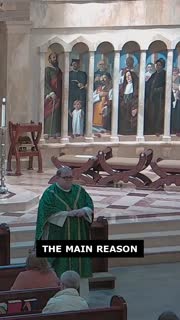Marriage: A Sacred Covenant of Love and Sacrifice
Devotional
Sermon Summary
Bible Study Guide
Sermon Clips
1) "There is sanctity in marriage. That for those who are called to that vocation, holiness is there. If we let it enter us. If we pursue it in a new and radical way. If we let Christ to really form our own relationships. Letting him into our hearts. Letting him into our lives. But then we hear in the gospel. The Pharisees come to Jesus and they say, well, Moses permitted divorce. And they were testing him. Because they know the law. They know what it was like in the beginning. And so they see what Jesus is going to say. They say, because of the hardness of your hearts, did Moses write this commandment for you? But in the beginning, it was not so." [02:01] (46 seconds)
2) "Man and woman might be together. So ultimately, we're called to communion with one another. Married persons are not, really. Of course, it's seen most perfectly in the Holy Trinity. God, a communion of persons. And that love overflows between the Father and the Son, which is the Holy Spirit. Same thing. Man and woman come together. And that love overflows. And it concretizes in children. So it's seen perfectly, that image in marriage. But all of us, no matter what vocation we have. Priest, married, consecrated, single, whatever it is. We're called for communion. And this is really kind of radical to today's culture." [02:46] (45 seconds)
3) "Because if it were, we would recognize that we're made for communion. That we're made to be together. That the individual does not somehow change. That the individual does not somehow trump the communion. That the individual does not somehow trump relationality. And that's not to say that somehow we shouldn't, you know, we can't do what we want. We can't be who we're called to be. We're not individuals that somehow, you know, that we can't thank for ourselves. That's not what I'm saying. But fundamentally, at our core, we're called to communion. First with God. And then with others. Especially those in our own vocation." [04:16] (36 seconds)
4) "The main reason I came down here is because we look at this cross, which I love. It's a cross. And I want to see what the dignity of marriage looks like. What the sanctity of marriage is all about. It's right there. Christ stretching forth his arms on the cross. Giving himself completely. That's what we're called to. Married or not, that's what we're called to. To stretch forth our arms daily and die for the other. Recognize that it's not all about me. That first and foremost, it's about Christ." [04:57] (43 seconds)
5) "And then it's about... The person to whom I've entrusted my life. That person that they've entrusted their lives to me. And this breaks down, as in the gospel, divorce. Somehow it breaks down when we no longer give ourselves to the other. And it's a terrible cross that so many people have to bear. More and more marriages end in divorce. And there's a host of reasons. We don't have to get into that today. But fundamentally at its core, Christ removes... Is removed from the center. Sacrifice is no longer at the center. Dying for the other is no longer at the center. And so it's our job each and every day of our own lives, of our vocation, to make sure that we're dying for the other." [05:49] (50 seconds)
6) "Am I sacrificing well? Am I dying well? Am I giving everything well? So that the dignity that is the sacrament of marriage, that the dignity that is this relationship, is made sure that it is whole. That it's alive. That it has flesh. That our hearts might not be hardened, as the gospel says, but we might have hearts of flesh. A beautiful heart of flesh, of course, on the cross. We read that the Roman soldier comes and he smears Christ in the heart after he is dead. And blood and water pours out. Ultimately symbolizing that Jesus has finally given everything." [06:38] (45 seconds)
7) "And so it's a good opportunity to reflect today, this week, am I dying well? Not a question we often ask. Am I living well? How are things going? Am I going through the checklist? Am I doing well in those areas? But ultimately, the Christian asks, am I dying well? Am I dying? Am I sacrificing for God? Am I giving him the time? Am I giving him those times throughout the day so I can be in communion with him? But also, am I dying for my spouse? Am I dying for my spouse, the church? Am I giving of myself radically and totally? Not rounding the corners a bit, as we often do, but ultimately, giving everything, just as Christ did." [07:20] (50 seconds)
Ask a question about this sermon
2) "Man and woman might be together. So ultimately, we're called to communion with one another. Married persons are not, really. Of course, it's seen most perfectly in the Holy Trinity. God, a communion of persons. And that love overflows between the Father and the Son, which is the Holy Spirit. Same thing. Man and woman come together. And that love overflows. And it concretizes in children. So it's seen perfectly, that image in marriage. But all of us, no matter what vocation we have. Priest, married, consecrated, single, whatever it is. We're called for communion. And this is really kind of radical to today's culture." [02:46] (45 seconds)
3) "Because if it were, we would recognize that we're made for communion. That we're made to be together. That the individual does not somehow change. That the individual does not somehow trump the communion. That the individual does not somehow trump relationality. And that's not to say that somehow we shouldn't, you know, we can't do what we want. We can't be who we're called to be. We're not individuals that somehow, you know, that we can't thank for ourselves. That's not what I'm saying. But fundamentally, at our core, we're called to communion. First with God. And then with others. Especially those in our own vocation." [04:16] (36 seconds)
4) "The main reason I came down here is because we look at this cross, which I love. It's a cross. And I want to see what the dignity of marriage looks like. What the sanctity of marriage is all about. It's right there. Christ stretching forth his arms on the cross. Giving himself completely. That's what we're called to. Married or not, that's what we're called to. To stretch forth our arms daily and die for the other. Recognize that it's not all about me. That first and foremost, it's about Christ." [04:57] (43 seconds)
5) "And then it's about... The person to whom I've entrusted my life. That person that they've entrusted their lives to me. And this breaks down, as in the gospel, divorce. Somehow it breaks down when we no longer give ourselves to the other. And it's a terrible cross that so many people have to bear. More and more marriages end in divorce. And there's a host of reasons. We don't have to get into that today. But fundamentally at its core, Christ removes... Is removed from the center. Sacrifice is no longer at the center. Dying for the other is no longer at the center. And so it's our job each and every day of our own lives, of our vocation, to make sure that we're dying for the other." [05:49] (50 seconds)
6) "Am I sacrificing well? Am I dying well? Am I giving everything well? So that the dignity that is the sacrament of marriage, that the dignity that is this relationship, is made sure that it is whole. That it's alive. That it has flesh. That our hearts might not be hardened, as the gospel says, but we might have hearts of flesh. A beautiful heart of flesh, of course, on the cross. We read that the Roman soldier comes and he smears Christ in the heart after he is dead. And blood and water pours out. Ultimately symbolizing that Jesus has finally given everything." [06:38] (45 seconds)
7) "And so it's a good opportunity to reflect today, this week, am I dying well? Not a question we often ask. Am I living well? How are things going? Am I going through the checklist? Am I doing well in those areas? But ultimately, the Christian asks, am I dying well? Am I dying? Am I sacrificing for God? Am I giving him the time? Am I giving him those times throughout the day so I can be in communion with him? But also, am I dying for my spouse? Am I dying for my spouse, the church? Am I giving of myself radically and totally? Not rounding the corners a bit, as we often do, but ultimately, giving everything, just as Christ did." [07:20] (50 seconds)







